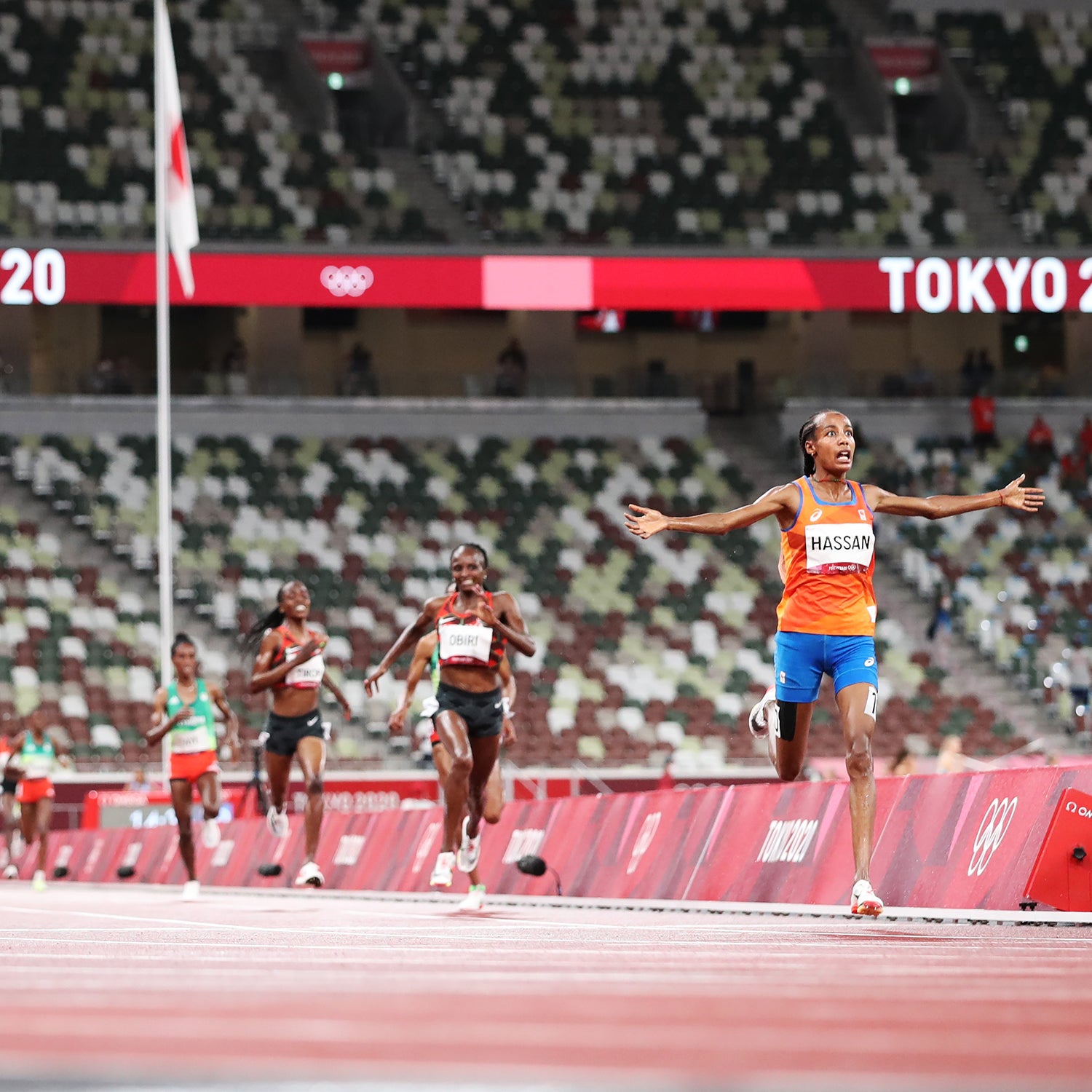ItÔÇÖs a rare occurrence that an Olympic track athlete delivers two immortal performances, in two different races, on the same day. But on Monday, at the Japan National Stadium in Tokyo, Sifan Hassan did just that by winning both her heat of the 1,500 meters and the final of the 5,000 metersÔÇôeach in dramatic fashion. Hassan, who is 28 and a Dutch national, is looking to become the first person to win (or medal in) three track distance events in the same Olympics: the 1,500, 5,000, and 10,000 meters. Regardless of whether she succeeds, todayÔÇÖs effort will be remembered as one for the ages.
At 9:47 A.M. local time on Monday, Hassan lined up in heat two during the preliminary round of the womenÔÇÖs 1,500 meters. Although the most likely result was that she would do just enough to qualify for WednesdayÔÇÖs semi-finals with ease, there was always the threat of a freak accident; she could step inside the rail and get hit . Or she could trip.
Perhaps looking to avoid getting tangled upÔÇöand knowing that she could rely on her unrivaled closing speed to finish in the top six and proceed to the next roundÔÇöHassan was content to hang towards the back of the pack until the last lap of the race. Seconds after the bell rang, however, KenyaÔÇÖs Edinah Jebitok lost her footing and fell directly in front of Hassan, who promptly crashed to the track herself. With less than 400 meters to run, looked to be out of itÔÇöat least for a brief, fleeting instant.
Popping back up, Hassan proceeded to turn on the jets and gradually reel in her competitors as if she had them on an invisible string. By the time she rounded the turn coming into the home straight, she had caught the lead pack. Somehow, she continued to move up even as she relaxed her pace with a top six finish already in the bag. Hassan ended up winning her heat in a performance that appeared both impossibly hard and effortless at the same time. There have been previous instances of track legends taking a spill and coming back, but such a feat is typically only feasible when the fall comes earlier on in a longer race, as was the case at the 1972 when Lasse Viren . Doing it in the last lap of a 1,500 is another thing altogether.
WhatÔÇÖs more, Hassan had another race in less than 12 hours. The last event of the day was the womenÔÇÖs 5,000-meter final, which was scheduled for 9:40 P.M. and pitted her against KenyaÔÇÖs Helen Obiri, the reigning world champion in the distance.
Once again, Hassan wisely chose to hang back early, sitting comfortably in the pack, as Ririka Hironaka, from Japan, took the lead early and tried to keep things honest. Despite HironakaÔÇÖs efforts, the that has haunted the distance events of these Olympics had the leaders come through 4,000 meters on pace to run just under 15 minutes in a race where several of the top dogs have personal bests under 14:20.
It was, in other words, going to be a race with a fast finish. Normally, this would have suited Hassan just fine, but as she found herself surrounded by some of the best kickers in the world with 400 meters to go, it was far from certain how she would respond, having already had to expend far more energy than she would have liked earlier on the same day. Could she do it again?
Indeed, she could. En route to hammering out a 57-second last lap, Hassan opened up a small gap on Obiri on the backstretch. For a moment, it seemed like the Kenyan would have enough left to challenge her Dutch rival over the final 100 meters, but instead it was Hassan who had another gear and pulled away to win her first Olympic title.
The final of the womenÔÇÖs 1,500 and 10,000 meters take place on consecutive daysÔÇöon August 6 and 7, respectively. The likelihood that Hassan will prevail in both remains slim, as she will be facing defending 1,500 Olympic champ Faith Kipyegon (who bested Hassan earlier this year) and the 10,000 world record holder Letensebet Gidey, among others. But after todayÔÇÖs performance, itÔÇÖs hard to bet against her.


